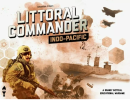Search
Using the filters to the left, click your selection, it will become bold and filter the results, click it again to remove that filter.
The political object is the goal, war is the means of reaching it, and means can never be considered in isolation from their purpose. - Carl von Clausewitz 1 Abstract The ‘levels of war’ is a doctrinal construct which describes the way political objectives are translated into military strategies which in turn guide tactical actions. Or at least that is what it should be. The operational level has been expanded and redefined over the last century by writers of Western doctrine. Unfortunately, the …
Author: Sebastian J Bae Dietz Foundation , 2022, 2-6 Players SKU: DTZ 2022-1-1 Reviewed by: Robert C Engen, PhD Wargaming is a fast-growing discipline within professional military education (PME). Much of my new job here at Deakin University’s Centre for Future Defence and National Security in Canberra involves wargaming for PME, and the Australian Army Research Centre has kindly provided a venue to review wargames relevant to PME and the Australian Army context. Littoral Commander is a …

Written by: Williamswon Murray Cambridge University Press , 2011, 332 pp Paperback ISBN: 9780511996252 Reviewed by: Chris Roberts Professor Emeritus Williamson Murray, a Vietnam veteran, has written, and co-edited over 20 books on strategy, military effectiveness and military history. All are worth reading. Murray bases his works on sound research of past events, keen analysis, and a deep understanding of the realities of politics, strategy and war. Underlying his work is a strong belief in the value …

Written by: Anthony King John Wiley & Sons , 2021, 288 pp Paperback ISBN: 978-1-509-54366-3 Hardback ISBN: 978-1-509-54365-6 Reviewed by: Charles Knight We run into a curious void in the literature of warfare. Those practitioners of the art who were also its ablest theorists, scholars and writers dwelt on its varied aspects to the limit of their imaginations. One thing, however, they did not touch upon—combat where life is centred. Run through the list of writers and their works—Frederick, de Saxe, …

Written by David Horner Allen & Unwin Book Publishers , 2022, 464 pp Paperback ISBN: 9781761065958 Reviewed by: John Nash Eminent historian David Horner’s latest work is concerned with Australian war leadership and asks the question: ‘Why has Australia gone to war nine times in a century?’ It focuses on the politicians and top-level military leaders in Australian history and examines why and how Australia committed its troops to wars, from the First World War through to the second Iraq War in 2003. …

Written by Craig Stockings University of New South Wales Press , 2022, 976 pp Hardback ISBN: 9781742236230 eBook ISBN: 9781742239354 Reviewed by: Jean Bou Australia has a unique tradition of official histories of its military commitments. In most countries, official histories reflect the tradition of the ‘staff history’. Produced by the military services themselves, the emphasis is on military matters and how those services went about things with the resources at their disposal. One consequence is …

Introduction This paper explores concepts being developed by the United States Marine Corps, UK Royal Marines and Royal Navy (including the US Concept for Stand-In Forces, and the British Commando Forces concept), in order to inform an Australian approach to stand-in manoeuvre in contested littoral environments. The paper first examines the challenges and implications of a contested littoral environment, identifying the need to operate in a distributed, low-profile, mobile, modular and sustained manner …
Introduction The global distribution of power is shifting to Asia, and Australia’s strategic risks are rising. With reduced warning time, emerging great power competition, and expanding regional navies, Australia’s risks are growing within the maritime domain of its immediate region. Australia’s 2020 Defence Strategic Update (DSU) and 2023 Defence Strategic Review (DSR) marked significant changes in its strategic approach, identifying the growing potential threat from China and shifting from multiple …
Introduction In the National Defence Statement that forms Part A of the public version of the Defence Strategic Review (DSR), the Minister for Defence, Richard Marles, states that ‘Army must be optimised for littoral operations in our northern land and maritime spaces and provided a long-range strike capability’. Elsewhere in the document, one of the key priorities for the Army is stated to be ‘land-based maritime strike’. [1] The concept of maritime force projection from land has been developing for some …
Introduction Since the Second World War, Australian naval, land and air forces have rarely had the opportunity to undertake amphibious operations on active deployments. On the evening of 24 May 2006, with firefights taking place around the Timorese capital of Dili and the government losing control of its own security services, the country’s political leaders requested assistance from Australia, New Zealand, Malaysia and Portugal ‘in sending defence as well as security forces from their countries to …
